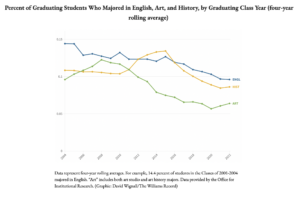Studying the Humanities in the 2020s
Seven tips from the college intern
At the close of a more tumultuous academic semester in recent memory — one replete with vitriolic debates over war in the Middle East, free speech, leadership crises at elite colleges, and a national reckoning over plagiarism — this intern finds himself finishing his history degree after a most peculiar college experience.
It’s no understatement to say that higher education has changed greatly since I began my studies, and this change is readily apparent in admissions practices.
Affirmative action initiatives peaked after the fervor of 2020, heavily influencing the composition and tenor of student cohorts across the country before the Supreme Court outlawed the practice this past summer.
Standardized tests like the SAT and ACT have been deemphasized in favor of more qualitative metrics. Fewer students take standardized tests today compared to 2019, one of many indications that elite colleges’ less rigorous, post-COVID admissions policy changes have already affected student behavior.
From my biased perspective, the precipitous, consistent dropoff in students studying the humanities is noteworthy. History majors declined nationally by almost one-third between 2012 and 2019. The recent trends for humanities majors at Williams College, a liberal arts institution very much like that which I attended in California, are shown in the table below. They tell a sad tale.

So, as I end my collegiate career with a degree in one of those “downward-sloping” academic disciplines, I thought to offer seven guiding principles that helped me stay motivated and interested in what I was learning. May they help another college student thinking about studying history or any other humanities subject, and hopefully reverse the trend seen at Williams, my own liberal arts college, and others across the country.
Follow the great books
For brash eighteen-year-olds raised on Wikipedia and SparkNotes, reading the classics offers valuable insight and a good intellectual humbling. Any theory course with a reading list that includes Herodotus, Thucydides, Plato, and Aristotle offers an elevated caliber of reasoning and analysis of the Western tradition’s great minds, a time-tested curriculum that is impossible to replicate with other source material. All students, irrespective of major, could benefit from great books study.
Do the reading — not for anyone else, but for you
Grade inflation and declining standards have made it easier than ever to get an A in a college course while putting in reduced effort. Now more than ever one truly gets out what one puts in. Getting by with a quick skim of the material before class may not harm students on paper, but it won’t let them understand the subtleties of the professor’s and course’s message. They will also have meaningful insight to contribute in class discussions, instead of non-sequiturs that usually begin with “like for me personally…”
Be wary of courses with ideological, narrow focuses
In the college course catalogues of this decade, many options resemble word salad from the woke urban dictionary. Esoteric titles like “mapping intersectional discourses,” “gendered feminisms,” or “queering the body politic” leave little indication of their respective courses’ scholarly underpinnings, while loudly signaling the dominant ideology in class. I learned more and thought more critically in courses with a general, narrative-based theme — “Classical Political Theory,” “Early East Asian History,” and “World War Two in East Europe”— which allowed their students to reach individual analytical conclusions instead of those bathed in nouveau ideology.
Take classes with professors who appreciate perspective and challenge you
This tip involves a bit of luck. Everyone is at the mercy of some chance while hunting through the course catalogue, but those who do find that prof with the time and energy to invest in their students’ success are well-positioned to reap the benefits. Developing valuable relationships with professors may not happen quickly, which is why taking multiple courses from favored professors is the surefire way to maximize those four years.
Speak your mind, and don’t be afraid of your classmates
Rigidity and silence abound in today’s cruel polemic. Far too often, people avoid sharing their thoughts and opinions because they fear ostracization, not because speaking out is de jure prohibited. I found that confidently expressing my ideas often drew a less vitriolic response, if any, than what I had imagined in my head. The group is often more afraid of countervailing ideas than the contrarian is afraid of the group.
Remember the real world
College can often feel like a self-sustaining ecosystem ridden with groupthink; it is vitally important that students have valuable learning experiences outside this environment before they graduate. Taking advantage of the internships, summer jobs, study abroad, and domestic exchange programs on offer will ensure a smoother transition to life after graduation.
ALWAYS do your own writing — it may come in handy
Humanities majors learn to write. This time-honored maxim runs the risk of losing its accuracy with the rise of new AI learning software that generates passable prose faster than anyone living. Soon its prose will be more than passable, but as of now, AI’s shortcomings leave a window for well-trained writers and critical thinkers to prosper in this digital age. That is if they can still write better than the average language model. To all my fellow so-called “useless BAs,” take notice!
Jude Iredell is a Roger Perry Civics Intern with the Pioneer Institute. Last week, he completed his bachelor’s in history at Pomona College.



